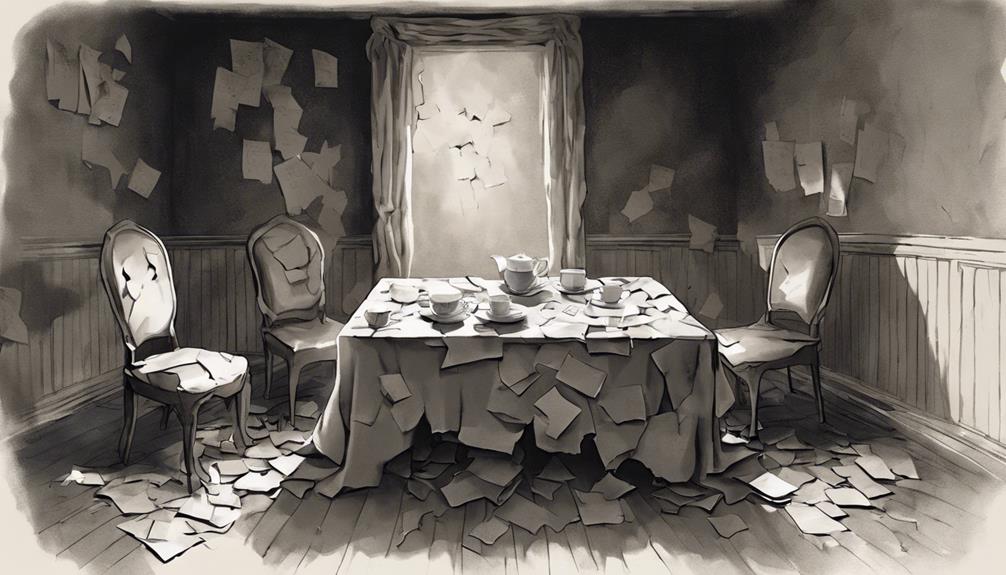When you face marriage betrayal, it's essential to prioritize your emotions and well-being. Allow yourself to feel anger and grief; these reactions are completely normal. Communicate openly with your partner, creating a safe space for honest dialogue. Consider seeking professional help, as therapy can provide valuable guidance and emotional support. Rebuilding trust and intimacy takes time and patience, so celebrate small victories along the way. Remember, you don't have to go through this alone—supportive friends and loved ones can be a pillar of strength. For deeper insights on healing, there's much more to explore on this journey.
Understanding the Betrayal

When you discover betrayal in your marriage, it's normal to feel a whirlwind of emotions like shock, anger, and deep sadness. Understanding the causes of betrayal can help you make sense of this painful experience.
Often, betrayals stem from unmet needs, lack of communication, or even personal struggles your partner may be facing. It's vital to recognize that this doesn't justify their actions, but it can provide insight into why it happened.
As you navigate this tumultuous time, implementing coping strategies will be essential. Start by allowing yourself to feel your emotions without judgment.
Journaling can be a powerful tool for processing your thoughts and feelings. Surround yourself with supportive friends or family who can offer a listening ear.
Consider seeking professional help, as a therapist can guide you through your feelings and help you understand the dynamics at play.
Emotional Responses to Infidelity
Discovering infidelity can trigger a complex array of emotional responses, making it important to acknowledge and navigate feelings like betrayal, grief, and confusion. You might feel a surge of anger that seems overwhelming. It's essential to practice anger management techniques, like deep breathing or physical activity, to prevent that anger from consuming you.
As you process these feelings, remember that grief is a normal reaction. This loss can feel like mourning a part of your relationship, and it's okay to give yourself permission to feel sad. Finding effective coping strategies can help you manage this emotional turmoil. Journaling your thoughts can provide clarity, while support groups or talking to friends can offer comfort and understanding.
In this challenging time, focus on self-care. Engage in activities that bring you joy or peace, whether it's spending time outdoors or pursuing a hobby. Each of these steps can help you gradually regain a sense of stability.
Communicating With Your Partner

Maneuvering conversations with your partner after infidelity can feel intimidating, but open and honest communication is essential for both healing and understanding.
Start by creating a safe space for dialogue. This means choosing a quiet, calm setting where both of you can express your feelings without distractions.
Practice active listening; this isn't just about hearing words but truly understanding your partner's emotions. Show empathy and validate their feelings, even if you don't agree with everything they say. It's vital to acknowledge the pain and hurt that has been caused.
Your honest expression is equally important. Share your feelings openly, whether it's anger, sadness, or confusion. Use “I” statements to express how you feel without placing blame, which can help prevent defensiveness.
For example, saying “I feel hurt” instead of “You hurt me” keeps the focus on your experience.
Seeking Professional Help
Sometimes, despite your best efforts to communicate openly, the emotional turmoil after betrayal can feel overwhelming. Seeking professional help can provide the guidance and support you both need to navigate this challenging journey. Therapy options abound, and finding the right fit can make a significant difference in your healing process.
Consider exploring couples counseling, where a trained therapist can facilitate constructive conversations, helping you both articulate your feelings and needs. They often employ effective counseling techniques, such as active listening and empathy-building exercises, which can soften the emotional barriers between you.
Individual therapy can also be beneficial, allowing each of you to process your feelings in a safe environment. Don't hesitate to ask for recommendations or research therapists who specialize in betrayal trauma. They can offer tailored strategies to help you cope with the intense emotions you're experiencing.
Rebuilding Trust and Intimacy

Rebuilding trust and intimacy after betrayal requires patience, open communication, and a genuine commitment from both partners to heal together. You need to create a safe environment where both of you can express your feelings honestly.
Start with trust exercises that encourage transparency and vulnerability. For instance, sharing daily reflections about your emotions can foster understanding and connection.
Intimacy builders are equally essential. Schedule regular date nights or quiet moments together to rebuild that emotional closeness. These moments can help break down walls and create a renewed sense of togetherness.
Don't shy away from physical intimacy as well; small gestures like holding hands or cuddling can reignite that spark.
It's important to acknowledge that rebuilding trust won't happen overnight. Expect setbacks, and be prepared to navigate them with compassion. Celebrate small victories along the way—each step forward strengthens your bond.
Finally, remember that both partners must actively engage in this process. Only through mutual effort can you truly heal and emerge stronger together.
Embrace this journey; it can lead to a deeper, more meaningful connection than you may have ever imagined.
Supporting Family Members
Supporting family members through the turmoil of marriage betrayal requires you to listen with empathy and offer a reassuring presence as they navigate their emotions. When someone you care about is hurting, your emotional support can make a profound difference. Be there to hear their feelings without judgment, providing a safe space for them to express their pain.
Understand that family dynamics can shift dramatically during this time. People may react differently, and it's crucial to validate each person's feelings. Encourage open dialogue among family members, fostering an environment where everyone feels safe to share their thoughts and emotions.
You might find it helpful to suggest family activities that promote bonding, allowing everyone to reconnect and support one another. Remind your loved ones that they're not alone in this struggle; together, you can weather the storm. Your consistent presence and understanding can help them feel anchored amidst the chaos.
Ultimately, your role is to be a pillar of strength, guiding them gently through their grief while reinforcing the importance of healing within the family unit. Your support can help rebuild trust and connection, even through the darkest times.
Moving Forward Together

As you all come together in the aftermath of betrayal, it's important to focus on how to heal as a unit and create a path forward that fosters understanding and connection.
Start by openly discussing your feelings, fears, and hopes. This dialogue can transform shared experiences into a foundation for rebuilding trust.
Reflect on what led to this moment and recognize the complexities involved. It's essential to validate each other's emotions, even if they're uncomfortable. Acknowledging pain can pave the way for healing.
Then, shift your focus to your future goals. What do both of you envision for your relationship moving forward? Setting shared objectives can help you feel united in purpose.
You might consider counseling, where a neutral party can facilitate your discussions and guide you toward effective communication strategies.
Together, create rituals or activities that strengthen your bond, whether it's date nights or collaborative projects.
Conclusion
Facing marriage betrayal is incredibly painful, but remember, healing is possible.
By openly communicating, seeking professional guidance, and being patient with each other, you can navigate these turbulent waters.
It's crucial to rebuild trust and intimacy at your own pace, leaning on each other for support.
While the journey may be challenging, take comfort in knowing that many couples emerge stronger.
Trust in the process, and allow yourselves the grace to heal and grow together.



















